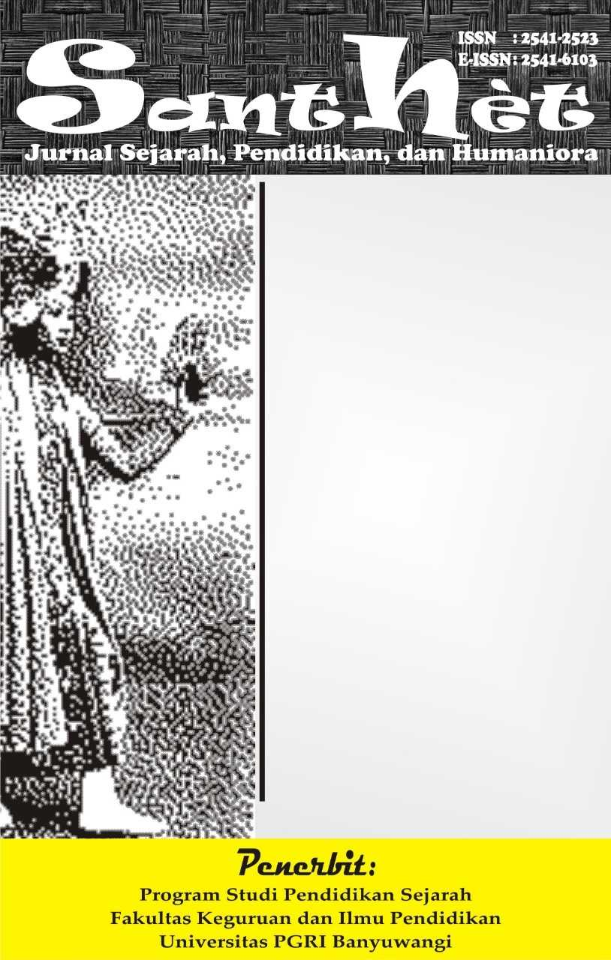THE INFLUENCE OF EMOTIONAL INTELLIGENCE ON CAREER ADAPTABILITY MEDIATED BY CAREER DECISION SELF-EFFICACY
Pengaruh Kecerdasan Emosional terhadap Kesiapan Karir pada Mahasiswa Fakultas Ekonomi dan Bisnis dalam Mempersiapkan Karir dengan Efikasi Diri Keputusan Karir sebagai Variabel Mediasi
DOI:
https://doi.org/10.36526/santhet.v9i1.4974Keywords:
Emotional Intelligence, Career Adaptability, Career Decision Self-EfficacyAbstract
This study aims to analyze the effect of emotional intelligence on career adaptability in students of the Faculty of Economics and Business, Padang State University, with career decision self-efficacy as a mediating variable. Using a quantitative method with a survey approach, data were collected from 100 samples were used which were then processed using the SmartPLS v.4.1.0.2 application. The results of this study show that: (1) Emotional intelligence has a positive influence on career adaptability, (2) Emotional intelligence has a positive influence on career decision self efficacy, (3) Career decision self-efficacy has a positive influence on career adaptability, (4) Career decision self-efficacy mediates the influence of emotional intelligence on career adaptability
References
Autin, K. L., Douglass, R. P., Duffy, R. D., England, J. W., & Allan, B. A. (2017). Subjective social status, work volition, and career adaptability: A longitudinal study. Journal of Vocational Behavior, 99, 1–10. https://doi.org/10.1016/j.jvb.2016.11.007
Bandura 1977. (n.d.).
Bocciardi, F., Caputo, A., Fregonese, C., Langher, V., & Sartori, R. (2017). Career adaptability as a strategic competence for career development: An exploratory study of its key predictors. European Journal of Training and Development, 41(1), 67–82. https://doi.org/10.1108/EJTD-07-2016-0049.
Coetzee, M., & Harry, N. (2014). Emotional intelligence as a predictor of employees’ career adaptability. Journal of Vocational Behavior, 84(1), 90–97. https://doi.org/10.1016/j.jvb.2013.09.001
Darmayanti, K. K. H., Mini, R., Salim, A., & Damayanti, K. K. H. (n.d.). The Enhanced Career Decision-Making Self-Efficacy by Emotional Intelligence Depended on Proactive Personality. In Electronic Journal of Research in Educational Psychology (Vol. 18, Issue 1).
Darmayanti, K. K. H., & Salim, R. M. A. (2020). The enhanced career decision-making self-efficacy by emotional intelligence depended on proactive personality. Electronic Journal of Research in Educational Psychology, 18(50), 121–142. https://doi.org/10.25115/EJREP.V18I50.2685
Duffy, R. D. (2010). Sense of Control and Career Adaptability Among Undergraduate Students. Journal of Career Assessment, 18(4), 420–430. https://doi.org/10.1177/1069072710374587
Goleman_2004_Leadership The Power of Emotional Intellegence. (n.d.).
Hamzah, S. R., Kai Le, K., & Musa, S. N. S. (2021). The mediating role of career decision self-efficacy on the relationship of career emotional intelligence and self-esteem with career adaptability among university students. International Journal of Adolescence and Youth, 26(1), 83–93. https://doi.org/10.1080/02673843.2021.1886952
Hirschi, A. (2009). Career adaptability development in adolescence: Multiple predictors and effect on sense of power and life satisfaction. Journal of Vocational Behavior, 74(2), 145–155. https://doi.org/10.1016/j.jvb.2009.01.002
Kwon, J. E. (2019). Work Volition and Career Adaptability as Predictors of Employability: Examining a Moderated Mediating Process. Sustainability (Switzerland), 11(24). https://doi.org/10.3390/su11247089
Mayer, J. D., Caruso, D. R., & Salovey, P. (2016). The Ability Model of Emotional Intelligence: Principles and Updates. Emotion Review, 8(4), 290–300. https://doi.org/10.1177/1754073916639667
Mayer, J. D., & Salovey, P. (1993). The Intelligence of Emotional. In INTELLIGENCE (Vol. 17).
Mittal, S. (2020). Ability-based emotional intelligence and career adaptability: role in job-search success of university students. Higher Education, Skills and Work-Based Learning, 11(2), 454–470. https://doi.org/10.1108/HESWBL-10-2019-0145
Monteiro, S., Vasconcelos, R. M., & Almeida, L. (2021, March 14). Perceived Employability and Career Adaptability of Engineering Graduates. EDUNINE 2021 - 5th IEEE World Engineering Education Conference: The Future of Engineering Education: Current Challenges and Opportunities, Proceedings. https://doi.org/10.1109/EDUNINE51952.2021.9429142
Parmentier, M., Pirsoul, T., & Nils, F. (2019). Examining the impact of emotional intelligence on career adaptability: A two-wave cross-lagged study. Personality and Individual Differences, 151. https://doi.org/10.1016/j.paid.2019.05.052
Pong, H. K., & Leung, C. H. (2023). Cross-sectional study of the relationship between trait emotional intelligence and career adaptability of Chinese youths. BMC Public Health, 23(1). https://doi.org/10.1186/s12889-023-15372-w
Rasheed, M. I., Okumus, F., Weng, Q., Hameed, Z., & Nawaz, M. S. (2020). Career adaptability and employee turnover intentions: The role of perceived career opportunities and orientation to happiness in the hospitality industry. Journal of Hospitality and Tourism Management, 44, 98–107. https://doi.org/10.1016/j.jhtm.2020.05.006
Salovey, P., & Mayer, J. D. (n.d.). EMOTIONAL INTELLIGENCE.
Savickas, M. L. (1997). Career adaptability: An integrative construct for life-span, life-space theory. Career Development Quarterly, 45(3), 247–259. https://doi.org/10.1002/j.2161-0045.1997.tb00469.x
Savickas, M. L., & Porfeli, E. J. (2012). Career Adapt-Abilities Scale: Construction, reliability, and measurement equivalence across 13 countries. Journal of Vocational Behavior, 80(3), 661–673. https://doi.org/10.1016/j.jvb.2012.01.011
Sugiyono-2013-Metode-Penelitian-Kuantitatif-Kualitatif-dan-R-D-1. (n.d.).
Sugiyono. (2022). Metode penelitian kuantitatif, kualitatif dan r&d (2nd ed.). Alfabeta.
Super, D. E., & Knasel, E. G. (1981). Career Development in Adulthood: Some Theoretical Problems and a Possible Solution. British Journal of Guidance & Counselling, 9(2), 194–201. https://doi.org/10.1080/03069888108258214
Taylor, K. M., & Betz, N. E. (1983). Applications of Self-Efficacy Theory to the Understanding and Treatment of Career Indecision. In Journal of Vocational Behavior (Vol. 22).
Tsai, C. T. (Simon), Hsu, H., & Yang, C. C. (2017). Career decision self-efficacy plays a crucial role in hospitality undergraduates’ internship efficacy and career preparation. Journal of Hospitality, Leisure, Sport and Tourism Education, 21, 61–68. https://doi.org/10.1016/j.jhlste.2017.08.002
Wang, N., Luan, Y., Zhao, G., & Ma, R. (2023). The antecedents of career decision self-efficacy: a meta-analysis on 20 years of research. Career Development International, 28(6–7), 633–648. https://doi.org/10.1108/CDI-04-2023-0092
Wilkins-Yel, K. G., Roach, C. M. L., Tracey, T. J. G., & Yel, N. (2018). The effects of career adaptability on intended academic persistence: The mediating role of academic satisfaction. Journal of Vocational Behavior, 108, 67–77. https://doi.org/10.1016/j.jvb.2018.06.006





























